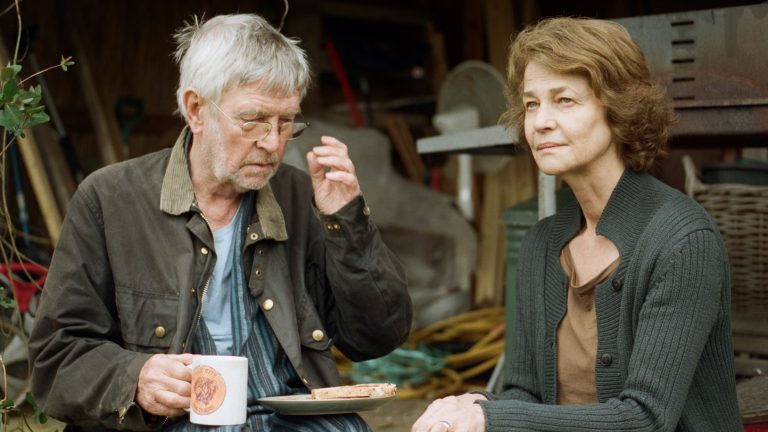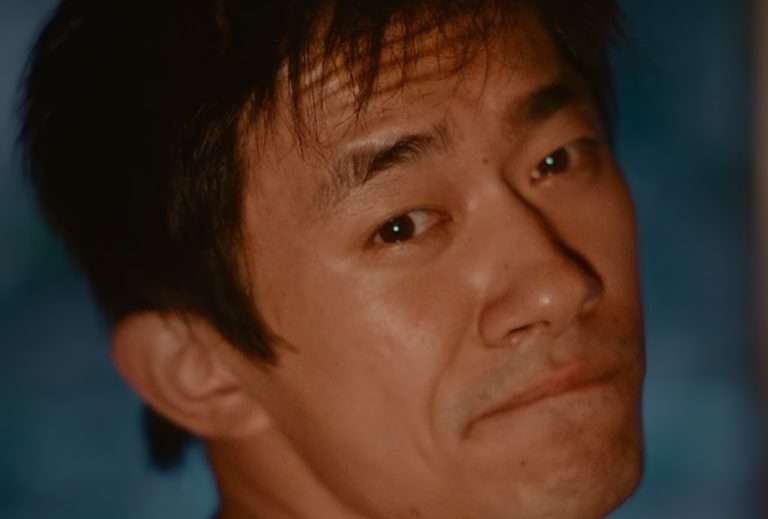“Apocalypse has come and gone. We’re all just grubbing in the ashes.”
– Samuel R. Delaney
This article contains spoilers: It’s hard to explain the plot of Angel’s Egg. You either risk giving away too much or explaining too little. Suffice it to say that the film follows a little girl and a soldier who wander a Giger-esque landscape as The Girl carries an egg with her, protecting it beneath the folds of her clothes. The plot simply unfolds through their journey, zen-like and atmospheric, and to give a list of the handful of important events would rob them of their potency.
The final product is a meditation on the nature of despair. With precious little dialogue and only a handful of clues to the nature of the apocalypse that has seized this world, Angel’s Egg is a film that succeeds through its style and symbolism. The bizarre art nouveau style of the blue/black city is at once frightening and spellbinding. We enter a hauntingly beautiful purgatory for the viewer to live in as the little girl paces from one set piece to the next. As we discover more of the ruined city and the beauty woven into its bleakness, we’re forced to ruminate on the nature of this place and what of it, if anything, can be redeemed.
The Girl is seeking this redemption, even if, for a time, she doesn’t remember it. While it’s hard to say exactly what she expects from the egg that she carries, we learn that her journey represents a rebirth. The world of Angel’s Egg is full of rich, moody blues and harsh blacks, including the Golgotha of fossils that the girl calls her home, the twilight forests beyond, and the desolate fishing town (three of the only locations we see). Yet the girl and her egg stand out in pale alabaster white, clothed in deep burgundy and powder pink, distinguishing her from the soulless city and its wraith-like inhabitants. She scavenges the wasteland for jam and crystal flasks, patiently waiting (for what might be millennia) for the day the egg hatches into something that can find the salvation man has given up searching for.
So what does the soldier want? Is he an ally or an enemy? Believe it or not, this is even less clear. He admits that he has been searching for so long that he has forgotten the reason, but the small number of clues we’re given can help us interpret. For the optimistic, he could be the ying to the girl’s yang—a necessary stoic counterpart to her innocent, motherly persona. An Adam to her Eve, for the film is saturated with biblical symbolism. His definitive act (which I won’t spoil here) is brutal, but it allows for an evolution. New life begins to flourish thanks to him. His actions immortalize the girl as a statue on the surface of an orb-like spaceship while he remains alone. Possibly, he has taken on the sins of humankind for himself to bear, like the unmistakably cross-shaped device he carries on his shoulder.

A more nihilistic take could be that he represents a force of destruction. He appears to the girl among a row of sinister tank-like monstrosities, and his cross looks like it could be a weapon of some kind, perhaps even a rifle. The soldier (for he wears a uniform) might suggest central darkness at the heart of the human condition, a kind of embodiment of war and conquest, and the fateful sin he commits is an act that dooms himself, and the hell he has gained dominion over, into a solitary life of drifting within an endless black sea where all that’s left of the fish are their shadows.
Your mileage may vary, but I was struck with the theme of hope versus despair while watching the film. The egg has always symbolized hope and rebirth, especially in the Christian tradition, where this film borrows much of its symbolism and narrative from (the story of Noah’s Ark plays a crucial role). It’s hard not to imagine the girl as an optimist as she explores the empty city, eager to collect the perfectly rounded flasks she finds scattered about the place. While the ghosts of the fishermen suggest that this world has been plundered of practically all life, the girl seems to find joy in the simple act of care for the egg and the occasional sip of life-giving water that flows freely from a courtyard fountain.
Perhaps the highly symbolic ending, or indeed the film as a whole, can be considered a litmus test for the viewer to gauge your reaction to the enigmatic narrative. It’s a meditation on grief, loss, and redemption that strikes at the subconscious like a harpoon flung into shadow. As much as I would like to consider the film to have a positive ending, it’s hard to argue against the palpable sense of dread and hopelessness in its unforgettable final moments. Despite its tight runtime and poor initial reception, Angel’s Egg stands tall as a masterpiece of the anime genre. Critics and fans of the cult film praise its incredible vision.
The aesthetics of retro anime are rendered into a completely new vision, a far cry from slice-of-life high schoolers and starbound mech warriors that this era of anime is better known for. For audiences keyed into the film’s singular wavelength, the mystery of Angel’s Egg is as gripping as it gets. Long lapses of silence and mood only elevate the material, much in the way films like Eraserhead (1977) or 2001: A Space Odyssey (1968) achieve a kind of transcendent majesty through their languid tension.
Impatient viewers might struggle with the film, but for fans of the work of Tarkovsky (Oshii cites as a strong influence) or films with minimal, highly symbolic narratives (Beau Travail, 1999 is another excellent example of a similar approach to storytelling), Angel’s Egg is a must watch. It’s a towering achievement in animation and visual storytelling. It is mysteriously profound in a way that few films are able to achieve. Just don’t expect an explanation from Oshii himself. Even he’s at a loss when pressed in interviews to explain what any of it means.




![They Live [1988]: A Biting Satire On Modern Society](https://79468c92.delivery.rocketcdn.me/wp-content/uploads/2017/08/They-Live-768x432.jpg)
![Who We Are Now Review [2018]: A Hopeful Story mired in Despair](https://79468c92.delivery.rocketcdn.me/wp-content/uploads/2018/09/who-we-are-now-tiff-768x432.jpg)